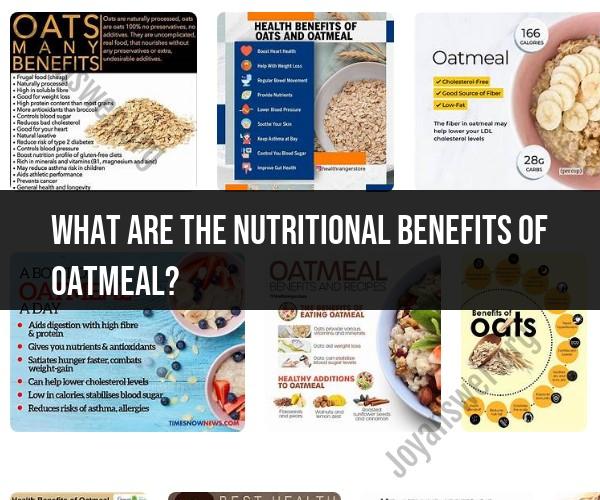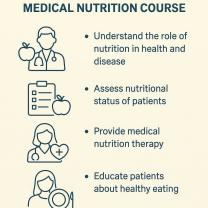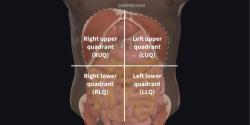What are the nutritional benefits of oatmeal?
Oatmeal is a highly nutritious whole grain that offers a wide range of health benefits. Here are some of the nutritional benefits of oatmeal:
Rich in Fiber: Oatmeal is an excellent source of dietary fiber, both soluble and insoluble. Soluble fiber, in particular, can help lower cholesterol levels and stabilize blood sugar. It also promotes a feeling of fullness, making it a great choice for weight management.
Heart Health: The soluble fiber beta-glucan found in oats has been linked to improved heart health. It can help reduce the risk of heart disease by lowering LDL (bad) cholesterol levels.
Low Glycemic Index: Oats have a low glycemic index (GI), which means they have a minimal impact on blood sugar levels. This makes oatmeal a suitable option for people with diabetes.
Nutrient-Rich: Oats are packed with essential nutrients, including manganese, phosphorus, magnesium, iron, and B vitamins. They also contain small amounts of protein.
Antioxidants: Oats contain antioxidants, particularly avenanthramides, which have anti-inflammatory and anti-itching properties. These compounds can help protect against oxidative stress and inflammation.
Digestive Health: Oatmeal's fiber content aids in digestion and can prevent constipation. It also promotes a healthy gut microbiome.
Weight Management: The fiber in oatmeal helps you feel full for longer, which can curb overeating and support weight management. It's a popular choice for a satisfying and nutritious breakfast.
Energy Source: Oatmeal is a complex carbohydrate that provides a steady release of energy, making it an excellent choice for a morning meal or pre-workout snack.
Gluten-Free Option: While oats themselves are gluten-free, they are often processed in facilities that handle gluten-containing grains. However, certified gluten-free oats are available for those with gluten sensitivities or celiac disease.
Versatile: Oatmeal is incredibly versatile and can be customized with a variety of toppings and mix-ins to suit different tastes and dietary preferences. You can add fruits, nuts, seeds, honey, cinnamon, or yogurt to enhance flavor and nutrition.
Easy to Prepare: Oatmeal is easy to prepare, making it a convenient choice for busy mornings or when you want a quick and nutritious meal.
To enjoy the full health benefits of oatmeal, it's best to choose whole rolled oats or steel-cut oats over instant oats, which are often more processed and may have added sugars and artificial flavors. Preparing oatmeal with water or low-fat milk and adding healthy toppings can make it a balanced and wholesome meal that supports overall health and well-being.
Nutritional Benefits of Oatmeal: Health and Wellness Insights
Oatmeal is a whole-grain cereal that is packed with nutrients. It is a good source of fiber, protein, complex carbohydrates, vitamins, and minerals.
Here are some of the nutritional benefits of oatmeal:
- Fiber: Oatmeal is a good source of soluble fiber, which can help to lower cholesterol levels and improve blood sugar control.
- Protein: Oatmeal is a good source of plant-based protein, which is essential for building and repairing tissues.
- Complex carbohydrates: Oatmeal is a good source of complex carbohydrates, which provide energy that lasts throughout the morning.
- Vitamins and minerals: Oatmeal is a good source of vitamins and minerals, including manganese, iron, copper, and magnesium.
Oatmeal is also a low-calorie food that is filling and satisfying. This makes it a good choice for people who are trying to lose weight or maintain a healthy weight.
The Role of Oatmeal in a Balanced Diet
Oatmeal is a versatile food that can be enjoyed as a breakfast, lunch, or snack. It can also be used in baking and cooking.
Oatmeal is a good source of fiber and complex carbohydrates, which are essential for a healthy diet. It is also a good source of vitamins and minerals, including manganese, iron, copper, and magnesium.
Oatmeal can be a part of a balanced diet for people of all ages and activity levels. It is a good choice for people who are trying to lose weight or maintain a healthy weight, as well as for people with chronic health conditions such as heart disease, diabetes, and high cholesterol.
Oatmeal and Its Impact on Heart Health and Digestion
Oatmeal has been shown to have a number of positive health benefits, including improving heart health and digestion.
Heart health: Oatmeal contains soluble fiber, which can help to lower cholesterol levels and improve blood sugar control. This can help to reduce the risk of heart disease.
Digestion: Oatmeal is a good source of fiber, which is essential for digestive health. Fiber helps to keep the digestive system moving and can help to prevent constipation.
Creative and Healthy Oatmeal Recipes
Oatmeal can be made in a variety of ways to suit your taste and dietary needs. Here are a few creative and healthy oatmeal recipes:
- Savory oatmeal: Add vegetables such as mushrooms, onions, and peppers to your oatmeal for a savory twist. You can also add herbs and spices such as garlic powder, paprika, and cumin.
- Sweet oatmeal: Add fruits and nuts to your oatmeal for a sweet and satisfying breakfast. You can also add spices such as cinnamon and nutmeg.
- Overnight oats: Soak oats overnight in milk or yogurt for a quick and easy breakfast. You can add fruits, nuts, and spices to your overnight oats.
Personal Stories of Oatmeal Enthusiasts and Their Nutritional Journeys
Oatmeal is a popular food among people who are trying to eat healthy. Here are a few personal stories of oatmeal enthusiasts and their nutritional journeys:
- Sarah: "I started eating oatmeal for breakfast every day a few years ago. I was trying to lose weight, and I found that oatmeal was a filling and satisfying breakfast option. I also noticed that my energy levels improved throughout the morning. I still eat oatmeal for breakfast every day, and I love that it is a healthy and versatile food."
- John: "I have heart disease, and oatmeal is a part of my daily diet. I eat oatmeal for breakfast every day, and I also add oats to soups and stews. I have found that oatmeal helps to lower my cholesterol levels and improve my blood sugar control."
- Mary: "I have diabetes, and oatmeal is a part of my daily meal plan. I eat oatmeal for breakfast and lunch, and I also add oats to snacks. I have found that oatmeal helps to control my blood sugar levels and keeps me feeling full."
Oatmeal is a healthy and versatile food that can be a part of a balanced diet for people of all ages and activity levels. It is a good source of fiber, protein, complex carbohydrates, vitamins, and minerals. Oatmeal has also been shown to have a number of positive health benefits, including improving heart health and digestion.













